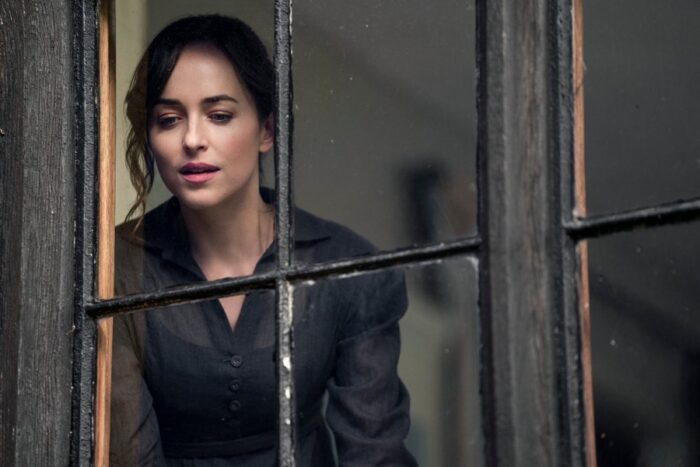Persuasion (2022) review: Bizarrely misjudged
Review Overview
Cast
6Visuals
6Script
1David Farnor | On 24, Jul 2022
Director: Carrie Cracknell
Cast: Dakota Johnson, Cosmo Jarvis, Henry Golding, Richard E Grant
Certificate: PG
“Now they were as strangers; nay, worse than strangers, for they could never become acquainted. It was a perpetual estrangement.” Those were the words of Jane Austen in her 1818 novel Persuasion. A beautifully sad tale of restraint, regret and melancholy, it’s back on our screens again in Netflix’s new adaptation – not that you’d recognise it. Directed by debut helmer Carrie Cracknell, the film is a playful, upbeat affair, one that does away with the restraint and melancholy and just leaves a resounding feeling of regret for all involved. Austen’s gorgeously rendered depiction of a former couple who have fallen away from each other is given a rewrite into something that’s part-Fleabag and part-Bridgerton. “Now we’re strangers,” says Anne (Dakota Johnson). “No, worse than strangers. We’re exes.”
There’s potential for that modern turn of phrase to still carry nuance and meaning that resonates with emotional truth, but Persuasion actively avoids any chance of nuance being found between its shallow, broad lines. That’s partly because it’s too busy focusing on trying to recreate the sparky magic that made its Bridgerton reworking such a charming success, but its mostly because it doesn’t seem to understand its source material at all, something that leaves the whole thing without depth and, even more fatal, without any sense of purpose.
The overall narrative is just about the same, as we pick up with Anne Elliot almost a decade after she turned down the opportunity to marry young sailor Frederick Wentworth, having been persuaded by her family that he was not a suitable prospect. Now, her family are still social climbers and obsessed with their image, but Anne has become a shell of her former self, racked with heartbreak and loneliness. A tangible sense of loss and longing seeped through the original text, but it’s jarringly missing here, as the script – by Ron Bass and Alice Victoria Winslow – aims for slapstick humour, knowing asides to camera and snappy one-liners. “A ‘5’ in London is a ’10’ in Bath!” is the kind of dialogue that sets the strangely jaunty tone, before we run upstairs to see Anne leafing through her diaries and mementoes with the swooning smiles of a teenager with a crush.
Johnson does a solid English accent and brings charisma to the part of Anne, but there’s no sense of consistency in her characterisation. She’s a muddle of inner and outer pressures, but the decision to try and capture this through smirking fourth-wall-breaks only muddles the mood further. Richard E Grant is having a ball as the superficial Walter Elliot and Mia McKenna-Bruce as Anne’s self-pitying younger sister, Mary, is brilliant, but with no heartfelt stakes to contrast their humour with, the whole thing becomes a confusingly lightweight comedy – if the aim of the whole project was to create something new, why call it Persuasion at all?
It doesn’t help that Cosmo Jarvis and Johnson have little chemistry, with Wentworth turned into a sub-Mr Darcy figure without any brooding complexity – although Henry Golding as the suave, sinister William Elliot is a delight. That kind of mismatch between the ensemble’s key players is echoed by the occasionally beautiful visual flourishes, as Cracknell (whose excellent theatre work includes the National Theatre’s Julie and the Young Vic’s Macbeth) treats us to floating, meditative snapshots of nature – a sign of what, perhaps, her vision originally was, but one that’s been swept aside by a fundamentally different commercial end goal.
A perpetually present rabbit, references to cappuccinos and constant swigging of bottles of wine leaves us in a limbo that’s somewhere between Joe Wright’s Pride and Prejudice, Clueless and Bridget Jones, but without the brains or personality of any of them. “Sometimes I have a dream that an octopus is sucking my face,” ventures Anne, during an awkward moment of silence. Sometimes, less is more.
















